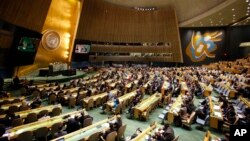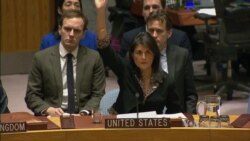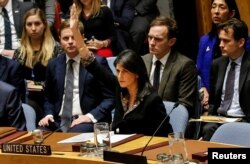The U.N. General Assembly on Thursday overwhelmingly adopted a resolution rejecting the U.S. decision to recognize Jerusalem as the capital of Israel and move its embassy there.
"The United States will remember this day in which it was singled out for attack in the General Assembly for the very act of exercising our right as a sovereign nation," U.S. Ambassador Nikki Haley told a packed hall ahead of the vote.
WATCH: U.N. General Assembly on Trump decision
"We will remember it when we are called upon to once again make the world's largest contribution to the United Nations, and we will remember it when so many countries come calling on us, as they so often do, to pay even more and to use our influence for their benefit," she added.
Israeli Ambassador Danny Danon, said, "Those who support today's resolution are like puppets pulled by the strings of the Palestinian puppet masters. You are like marionettes forced to dance while the Palestinian leadership looks on with glee."
Palestinian request
The Palestinians had asked for Thursday's emergency General Assembly session to consider the Egyptian-sponsored draft.
It followed a U.S. veto Monday in the Security Council of a nearly identical draft resolution, which the other 14 council members supported.
The General Assembly resolution reaffirms Jerusalem's special status as a holy city and as a final-status issue to be resolved in future Israeli-Palestinian negotiations. It also says "any decisions and actions which purport to have altered the character, status or demographic composition of the Holy City of Jerusalem have no legal effect, are null and void and must be rescinded.''
Unlike Security Council resolutions, the assembly measure is not legally binding, but it carries moral weight, demonstrating the will of the majority of the international community. It was adopted with more than a two-thirds majority of the 172 nations that voted — 128 nations supported the measure, nine voted against it and 35 countries abstained.
The United States and Israel were joined in voting "no" by Guatemala, Honduras, the Marshall Islands, Micronesia, Nauru, Togo and Palau.
More than 20 nations did not turn up for the controversial vote, including Ukraine and Georgia, which have sought U.S. help in dealing with Russian aggression against their countries.
Pressure campaign
Earlier this week, Haley wrote to many U.N. member states and warned them that she would be taking names and reporting back to President Donald Trump on how nations voted, noting the president was taking the vote "personally."
"History records names, it remembers names," Palestinian Foreign Minister Riyad al-Maliki told the General Assembly. "The name of those who stand by what is right and the name of those who speak falsehoods. Today we are seekers of rights and peace."
Turkish Foreign Minister Mevlut Cavusoglu flew in for the special session. He angrily dismissed Trump's warning that if countries voted against the United States, he might cut aid to them.
"Such an attitude is unacceptable," Cavusoglu said. "This is bullying and this chamber will not bow to that. It is unethical to think that the votes and dignity of member states are for sale. We will not be intimidated."
Among those who can scarcely afford to lose U.S. aid is Yemen, the poorest nation in the Middle East. Its ambassador voted for the resolution.
"There will be very close scrutiny and decisions made on that basis," U.S. Deputy Assistant Secretary of State Tim Lenderking said Thursday. "We have to measure that against the fact that there's a humanitarian catastrophe in Yemen."
But Lenderking called the possible cuts in aid to those who voted against the U.S. no "empty threat."
Some abstentions
U.S. lobbying ahead of the vote did persuade some countries to abstain, including neighbors Canada and Mexico.
"Mexico does not see it as positive or useful to the peace process that a unilateral declaration has taken place to recognize Jerusalem as the capital of Israel," Ambassador Juan Gomez Camacho said after the vote. "Nor do we believe it to be useful, and we see it as disproportionate, to convene an emergency meeting of the General Assembly."
Some of the European Union's 28 members broke with its consensus on Jerusalem, including the Czech Republic, Poland and Hungary, which all abstained.
Earlier this month, Trump said the United States considers Jerusalem the Israeli capital, and he started the process of moving the U.S. Embassy there.
Israel regards all of Jerusalem as its eternal capital, while the Palestinians want east Jerusalem as the capital of a future state and now say the United States is no longer a reliable partner in the peace process.
The Trump administration says it is committed to a two-state solution in the Middle East if that is what the parties want, and that the physical location of its embassy should have no bearing on the talks.
VOA National Security Correspondent Jeff Seldin contributed to this report.








